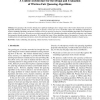Free Online Productivity Tools
i2Speak
i2Symbol
i2OCR
iTex2Img
iWeb2Print
iWeb2Shot
i2Type
iPdf2Split
iPdf2Merge
i2Bopomofo
i2Arabic
i2Style
i2Image
i2PDF
iLatex2Rtf
Sci2ools
135
click to vote
WINET
2002
2002
A Unified Architecture for the Design and Evaluation of Wireless Fair Queueing Algorithms
Abstract. Fair queueing in the wireless domain poses significant challenges due to unique issues in the wireless channel such as locationdependent and bursty channel errors. In this paper, we present a wireless fair service model that captures the scheduling requirements of wireless scheduling algorithms, and present a unified wireless fair queueing architecture in which scheduling algorithms can be designed to achieve wireless fair service. We map seven recently proposed wireless fair scheduling algorithms to the unified architecture, and compare their properties through simulation and analysis. We conclude that some of these algorithms achieve the properties of wireless fair service including short-term and long-term fairness, short-term and long-term throughput bounds, and tight delay bounds for channel access.
Fair | WINET 2002 | Wireless | Wireless Fair Service |
Related Content
| Added | 23 Dec 2010 |
| Updated | 23 Dec 2010 |
| Type | Journal |
| Year | 2002 |
| Where | WINET |
| Authors | Thyagarajan Nandagopal, Songwu Lu, Vaduvur Bharghavan |
Comments (0)

